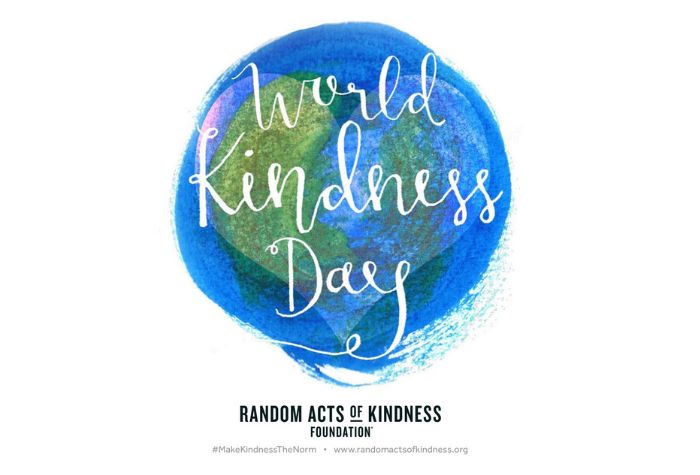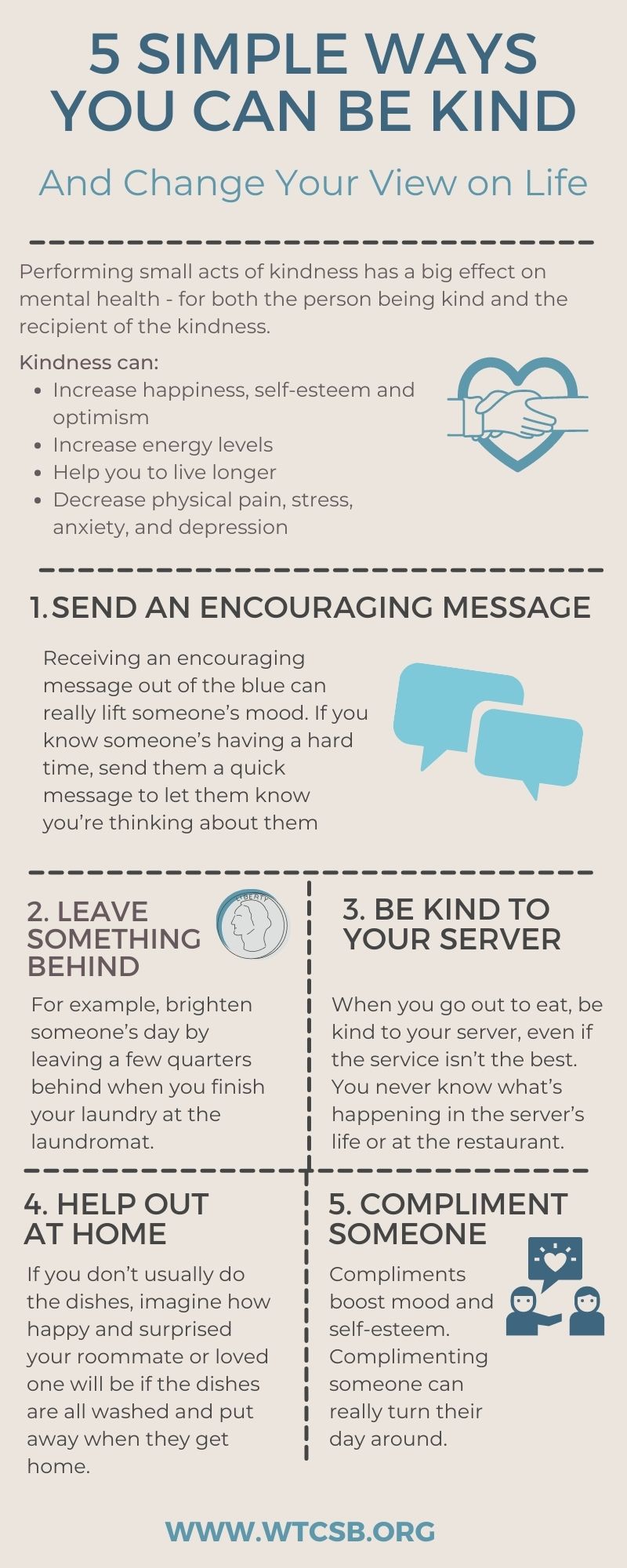What if we told you there’s an extremely simple way you can elevate your mood, feel good, live a happier life, and maybe even live longer – and that you could help others while helping yourself? Research shows that performing simple acts of kindness has a range of positive impacts on mental health and quality of life for both the person extending the kindness, and the person receiving it.
The Benefits of Small Random Acts of Kindness
Kindness Increases Happiness
Witnessing acts of kindness can increase our levels of oxytocin (the “love” hormone), which can increase our self-esteem and optimism, and can even improve our blood pressure and heart health. And a 2010 Harvard Business School survey that analyzed data from 136 countries found that human beings all around the world “derive emotional benefits from using their financial resources to help others,” resulting in higher overall happiness.
The findings from this survey suggest that “the reward experienced from helping others may be deeply ingrained in human nature, emerging in diverse cultural and economic contexts.” Being kind also boosts serotonin and dopamine, the neurotransmitters in our brains that give us feelings of wellbeing, satisfaction, and pleasure.
Kindness Increases Energy
One study by the Greater Good Science Center at UC Berkeley found that about half of the participants “reported that they feel stronger and more energetic after helping others; many also reported feeling calmer and less depressed, with increased feelings of self-worth.”
Kindness Increases Lifespan
The studies of Christine Carter, Ph.D, a sociologist, author, and Senior Fellow at the Greater Good Science Center at UC Berkeley, have found that people who volunteer tend to experience fewer aches and pains, and that people aged 55 and older who volunteer for two or more organizations have a 44% lower likelihood of dying early – and that’s after “sifting out every other contributing factor, including physical health, exercise, gender, habits like smoking, marital status and many more.”
Kindness Decreases Physical Pain
Being kind releases endorphins, the body’s natural pain killer. By participating in regular small acts of kindness and doing other things that release endorphins, like exercising, you can help your body to fight pain more effectively.
Kindness Decreases Stress and Anxiety
Being kind has been shown to decrease levels of stress and anxiety. One study found that people who practice kindness regularly have 23% less cortisol (the stress hormone) in their bodies, compared to the average population. And a University of British Columbia study monitored a group of highly anxious individuals, and asked them to perform at least six acts of kindness per week. After one month, there was a “significant increase in positive moods, relationship satisfaction, and a decrease in social avoidance in socially anxious individuals.”
Kindness Decreases Depression
Research from Case Western Reserve University School of Medicine shows that when we give to others, depression is reduced, and wellbeing is increased.
Small Acts of Kindness Have a Bigger Impact Than You Think
A 2022 study by the Journal of Experimental Psychology found that “people who perform a random act of kindness tend to underestimate how much the recipient will appreciate it” – and this misunderstanding could hold us back from doing nice things for others more often.
In one experiment of the study, participants were given a hot chocolate on a cold day at a skating rink, and were told they could keep it, or give it to a stranger as an act of kindness. The people who chose to give their hot chocolate away were asked to guess how big of an impact it had on the recipient, on a scale from 0-10, with 0 being a very small impact, and 10 being a very high impact. The recipients were then asked to rate the impact the gesture had on them, using the same scale. In that experiment – and all the others in the study – the people performing the act of kindness consistently underestimated how much it was actually appreciated.
5 Easy Ways You Can Incorporate Small Acts of Kindness Into Your Days – And Reap the Benefits of Being Kind
Taking a moment each day to show kindness can seem overwhelming, especially when you compare yourself and what you have to offer to others and what you think they can offer, but you don’t have to spend a lot of money on someone, or bake cookies or knit a homemade scarf to show kindness.
Dr. Marisa Franco, psychologist and author of “Platonic: How the Science of Attachment Can Help You Make – and Keep – Friends,” advises that you start by thinking about what you like to do: What skills and talents do you already have? And how can you use them to do something for someone else?
Here are a few ideas for small acts of kindness from the Random Acts of Kindness Foundation website to get you started:
1. Send an Encouraging Message or Email
Receiving an encouraging message out of the blue can really lift someone’s mood. If you know someone’s having a hard time, send them a quick message to let them know you’re thinking about them – or do it even if things seem fine. You never know what someone’s going through, and how much a gesture might mean to them.
2. Leave Quarters at the Laundromat
Doing laundry at a laundromat can be costly, and it’s a major expense for large families or families on a limited income. Brighten someone’s day by leaving a few quarters behind when you finish your laundry.
3. Be Kind To Your Server
When you go out to eat, be kind to your server, even if the service isn’t the best. You never know what’s happening at the restaurant or in the server’s life – there could be a very good reason they’re not smiling as they serve you. Often, servers work long shifts, sometimes up to 12 hours, with few bathroom and food breaks, so a little kindness (and a good tip) go a long way.
4. Help Out at Home
If you live with your family, a partner, or roommates, consider helping out at home more. If you don’t usually do the dishes, imagine how happy and surprised your friend or family member will be if the dishes are all washed and put away when they get home. A little break from an everyday chore can really lift someone’s mood.
5. Compliment Someone
Compliments boost mood and self-esteem. Whether you’re commenting on a stranger’s hairstyle or outfit, or a colleague or friend’s personality trait or skill that you admire, a compliment can really turn someone’s day around.
Let’s Make Kindness the Norm, Not the Exception, In Our Lives
As we get ready to celebrate World Kindness Day on November 13th, let’s look for ways to make kindness the norm, not the exception. World Kindness Day is the perfect time to start making small changes in your routine that can turn into habits. These regular acts of kindness are proven to improve your overall happiness and health, as well as the happiness of the person you’re being kind to. As Brooke Jones, Vice President of The Random Acts of Kindness Foundation, says:
“Kindness starts with one. One smile. One compliment. One cup of coffee. One conversation. Let’s lift the fog and make kindness the norm.”
Share the Infographic! Click to get the embed code
<a href=”https://www.wtcsb.org/how-incorporating-small-acts-of-kindness-into-your-day-can-change-your-view-on-life/“ target=”><img src=”https://www.wtcsb.org/wp-content/uploads/2022/11/How-Incorporating-Small-Acts-of-Kindness-Into-Your-Day-Can-Change-Your-View-on-Life.jpg” /></a>







